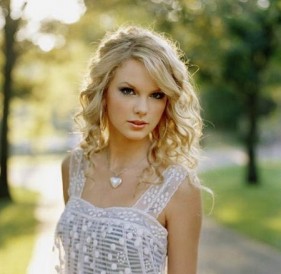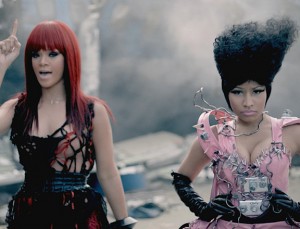COLLEGE FEMINISMS: Be the Bitch
By Nora Turriago
 Imagine, for a moment, you are Taylor Swift. You have luscious golden locks, yes, but for the moment brush them aside: there are more important matters to attend to.
Imagine, for a moment, you are Taylor Swift. You have luscious golden locks, yes, but for the moment brush them aside: there are more important matters to attend to.
Take a moment to reflect on all your hit songs, dedicated to the tumultuous ups and downs of your love life. As you hum a few lyrics, allow me to point out a reoccurring theme: you doing nothing but complaining. Now, before you get out your guitar and angrily sing me a rebuttal, allow me to explain. In the endless love songs of your musical past and present, the complaints of rocky relationships occur only after the passion has fizzled out.
Oh, Taylor, isn’t it a shame?
If only you had voiced your concerns or objections to your significant other in the heat of the moment, why, you could have been spared so much heartache!
Imagine if instead of remaining silent and only waiting until later to rant about the what ifs, Taylor Swift had chosen to simply say to her current infatuation: “Listen—you are a crazy weirdo who doesn’t heed the rules of hygiene, and this thing we have, you and me, well, it’s not going to work out. Hasta la vista.” Now, isn’t that a radical thought? Instead of hearing Taylor Swift’s latest song lamenting the faults of some guy as well as pitying herself for not leaving a bit sooner or for not speaking up, her lyrics would reflect a more powerful message: the exact opposite. Her love songs would feature not only the expected dosage of auto-tune and computerized beats, but also the much-needed messages for female listeners about speaking up, being assertive, and never looking back.
 If only Taylor Swift had been a bit more, well, bitchier, think of all the progress she would have made, all the bad relationships she could have spared herself, and all the empowered young women who might realize they don’t need a boyfriend to define them. It’s time for women to learn the benefits of being the bitch. It’s time to reclaim that term, dust it off, give it a good long look, and realize it’s not that bad to be one—in fact, it’s rather something to be proud of. As Tina Fey stated on Saturday Night Live, “Bitches get stuff done.”
If only Taylor Swift had been a bit more, well, bitchier, think of all the progress she would have made, all the bad relationships she could have spared herself, and all the empowered young women who might realize they don’t need a boyfriend to define them. It’s time for women to learn the benefits of being the bitch. It’s time to reclaim that term, dust it off, give it a good long look, and realize it’s not that bad to be one—in fact, it’s rather something to be proud of. As Tina Fey stated on Saturday Night Live, “Bitches get stuff done.”
And speaking as someone who identifies as a bitch, they certainly do get stuff done. A bitch is someone who is fearless. A bitch is someone who won’t take mistreatment from anyone; she laughs in the face of fear. Such “lackluster, dated gender roles and expectations don’t faze me,” a bitch will say through her body language, eye contact, or verbal articulations. A bitch is someone who speaks her mind, regardless of what others may think. She has no problem getting into a heated argument over a worthy cause, and she also looks out for her friends, encouraging them to do the same. A bitch is someone who knows exactly what she is capable of doing and receiving and won’t offer or take anything less. Bitches refuse to take no for an answer.
 Embodying the traits of the bitch is made all the more difficult when race is taken into account. The overly saturated sweetness of Taylor Swift takes on another dimension in this regard. She gets to be the “All-American Good Girl.” And this image is directly related to not only her musical content—she discourages listeners from straying from sexual purity, doesn’t use foul language, and is thoroughly absorbed in the demands of a rather tame, heterosexual love life—but also Swift’s whiteness. By possessing white skin, the “All American” label is determined. From this, the white female is consistently labeled as the good American girl next door. This dynamic is even further realized when contrasted against female pop artists of color like Rihanna or Nicki Minaj: singers who have a demanding presence that’s further emphasized via clothing and sexually charged lyrics. Female pop singers of color are allowed—in fact, expected—to embody a sexually promiscuous bad girl.
Embodying the traits of the bitch is made all the more difficult when race is taken into account. The overly saturated sweetness of Taylor Swift takes on another dimension in this regard. She gets to be the “All-American Good Girl.” And this image is directly related to not only her musical content—she discourages listeners from straying from sexual purity, doesn’t use foul language, and is thoroughly absorbed in the demands of a rather tame, heterosexual love life—but also Swift’s whiteness. By possessing white skin, the “All American” label is determined. From this, the white female is consistently labeled as the good American girl next door. This dynamic is even further realized when contrasted against female pop artists of color like Rihanna or Nicki Minaj: singers who have a demanding presence that’s further emphasized via clothing and sexually charged lyrics. Female pop singers of color are allowed—in fact, expected—to embody a sexually promiscuous bad girl.
But where is the black or brown Taylor Swift? Why are there no prominent female pop singers of color who are associated with the “good girl” traits of Swift? Just as she isn’t permitted to explicitly address sex in her songs or sing at a concert in scantly clad attire, Rihanna will never be associated with Swift’s so-called sweetness and innocence. And while one may call herself a “bad bitch” (a self declaration with multiple social implications: society likely already sees her as a bitch, but in a negative way), the other can’t even imagine voicing such a label.
 These contrasting images highlight not only a function of race, but who gets to be assertive, powerful, and confident. It is my sad conclusion that we simply do not have enough bitches in this world (and I mean bitches in the way I’ve described it, not the sexist and racist way it gets projected onto certain female bodies). The stuffy race and gender norms of yesteryear unfortunately remain present, as too often women in general are expected to remain passive, quiet and nice, and women of color are assumed to be the opposite. None of this is working for us. When women speak out forcefully, or perhaps dare to raise their voices and object to things, they are quickly reminded of gender protocol and intolerance for hearing what they have to say–especially when speaking about women’s rights. This is most commonly executed with the phrase, “don’t be a bitch.”
These contrasting images highlight not only a function of race, but who gets to be assertive, powerful, and confident. It is my sad conclusion that we simply do not have enough bitches in this world (and I mean bitches in the way I’ve described it, not the sexist and racist way it gets projected onto certain female bodies). The stuffy race and gender norms of yesteryear unfortunately remain present, as too often women in general are expected to remain passive, quiet and nice, and women of color are assumed to be the opposite. None of this is working for us. When women speak out forcefully, or perhaps dare to raise their voices and object to things, they are quickly reminded of gender protocol and intolerance for hearing what they have to say–especially when speaking about women’s rights. This is most commonly executed with the phrase, “don’t be a bitch.”
Four short words, yet don’t underestimate their strength: its enough to make almost anyone shut down. To which I say, own it. Being called a bitch is proving that you are overstepping preconceived gender stereotypes, to which the other person is very uncomfortable accepting. When a woman strongly voices her opinion, uses sarcasm instead of smiles, or chooses not to respond to a pitiful pickup line, she cannot be simply dismissed with an upward arch of the brow and a supposed insult. It must be said that women, believe it or not, are people too and sometimes they have bad days and don’t want to exchange pleasantries. Yet when women possess such attitudes, phrases like “don’t be a bitch,” are used to put them back in their subordinate place. “Look at the flagrancy you’re committing,” such a phrase yells, “why can’t you just shut up and look pretty!” And, of course, on the other side of the gender stereotype spectrum, men are contrastingly told to embrace this attitude, as they are expected to fulfill such behaviors. When a man exhibits a sardonic tone, he is embodying his apparent masculine duty. When a woman does, she is a trader to her gender.
To all those who feel smothered by placid mannerisms, I offer you this mind-blowing piece of advice: you can say something about it. Know the option exists of stating your view, be it popular or not, and dare the other person to do something about it. Such an exercise results in the most pleasing sensation: no longer a mere mortal, you are rather a majestic sage, ready to bring change to the world. And isn’t that how it should be? Imagine the possibilities if young girls plunged into new experiences, shaking off the smothering blanket of gender stereotypes to enter a world where women don’t think twice about speaking up and sharing their ideas or demands.
To all the women of the world, I’m telling you: release your inner bitch. Groom it. Use it. And listen while its throaty howl shatters the glass corners of the earth.
Next order of business: persuading Taylor Swift to release a condensed version of this message in the form of a catchy pop song.
______________________________________________
 Nora Turriago is a sophomore at Smith College, where she studies history and government. From Massachusetts, she is currently interning at Women’s Voices Worldwide, a non-profit that teaches women how to become stronger speakers.
Nora Turriago is a sophomore at Smith College, where she studies history and government. From Massachusetts, she is currently interning at Women’s Voices Worldwide, a non-profit that teaches women how to become stronger speakers.


20 Comments